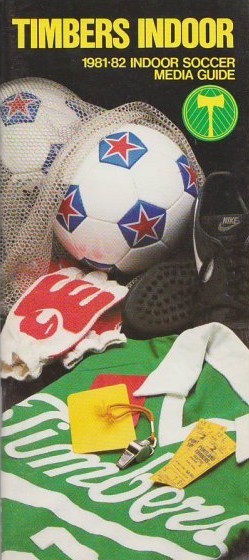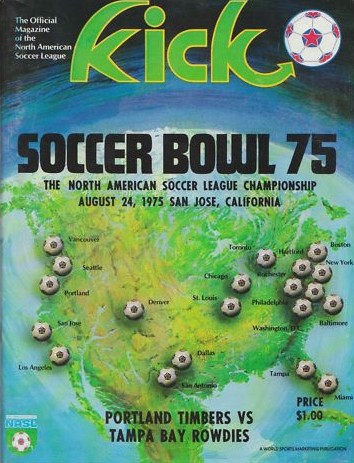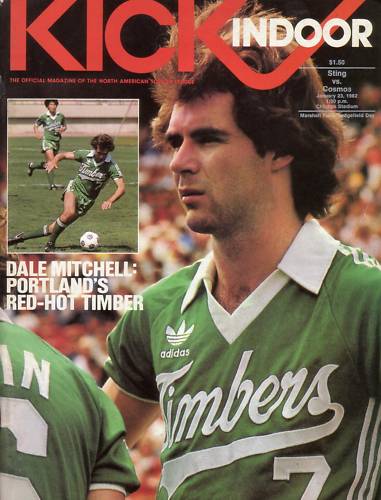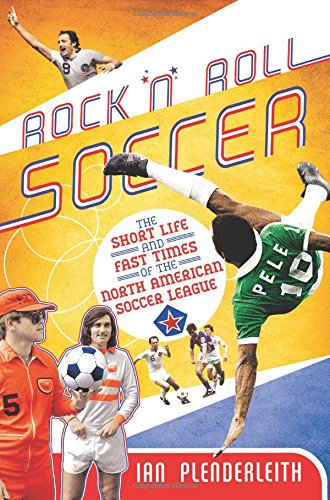North American Soccer League (1975-1982)
Tombstone
Born: January 23, 1975 – NASL expansion franchise11975 North American Soccer League Media Guide
Folded: October 21, 19822ASSOCIATED PRESS. “Timbers offer withdrawn”. The Democrat-Herald (Albany, OR). October 22, 1982
First Game: May 2, 1975 (L 1-0 vs. Seattle Sounders)
Last Game: August 22, 1982 (L 1-0 vs. Seattle Sounders)
Soccer Bowl Championships: None
Stadia
Outdoor Soccer:
Civic Stadium (26,912)31982 Official North American Soccer League Guide
Indoor Soccer:
Portland Memorial Coliseum (10,169)
Opened: 1960
Marketing
Team Colors: Kelly Green, Gold & White41982 Official North American Soccer League Guide
Television:
- 1978: KPTV (Channel 12 – 5 games)
Television Broadcasters:
- 1978: ?
Radio:
- 1978-1979: KEX (1190 AM)
- 1981: None
- 1982: KXL (750 AM)
Radio Broadcasters:
- 1978: Bob Robertson
- 1979: Greg Flakus
Ownership
Owners:
- 1975-1979: Oregon Soccer Inc. (John Gilbertson, Don Paul, et al.)
- 1979-1982: Louisiana-Pacific Corporation (Harry Merlo, Chairman)
Background
The Portland Timbers were an iconic soccer franchise that helped earn Portland the nickname “Soccer City U.S.A.”. The original Timbers (1975-1982) sparked a youth soccer boom in the Rose City and inspired numerous reunions, revivals and re-births over the years, culminating in the acceptance of a new Portland Timbers club into Major League Soccer in 2011.
The Timbers were formed in January 1975 as an expansion franchise in the North American Soccer League. The NASL had fumbled around in obscurity since 1968, but in 1975 the league sprang into new prominence when the New York Cosmos franchise signed the world’s most famous player, the Brazilian legend Pele.
Debut Season & Soccer Bowl ’75
The Timbers got a late start with barely three months to put a squad together before the season began in May. Most of coach Vic Crowe’s roster were British players on offseason loan from their English clubs. A modest crowd of 6,913 showed up for the Timbers’ first match against the Seattle Sounders at Civic Stadium on May 2, 1975. But Crowe’s team started winning and with each victory came more fans. By June, the Timbers were consistently drawing 15,000 for their home matches. By the end of July – 25,000.
The Timbers won the NASL’s Western Division with a 16-6 record. Portland opened the 1975 playoffs with a 2-1 overtime victory over the Seattle Sounders at Civic Stadium. The crowd of 31,523 was a new team record, but it stood for only five days. On August 17th, the Timbers shutout the St. Louis Stars 1-0 before a sell-out crowd of 33,503 and earned a trip to San Jose’s Spartan Stadium to play another expansion team, the Tampa Bay Rowdies, in Soccer Bowl ’75.
In past NASL seasons, Portland would have earned the right to host the championship game. But the NASL introduced the “Soccer Bowl” concept in 1975 in deliberate imitation of the NFL’s neutral site Super Bowl format. The previous season, the NASL’s weakly supported Miami Toros club earned home field advantage for the final, but with only two weeks to promote the match, the Toros embarrassed the league with only 15,000 fans on hand for the title game, which was broadcast on national television.
At Soccer Bowl ’75 in San Jose, the Timbers charmed season came to an end. Portland lost to the Rowdies 2-0.
Late 70’s Doldrums
In 1976 the Timbers regressed to 8-16. Despite the NASL’s generous postseason qualification format, the Timbers would miss the playoffs for three of the next four seasons. The large crowds stayed for another season or two, but the Timbers formally ceded Hottest Ticket in Town status to the Bill Walton-era Portland Trailblazers, who won the NBA title in 1977. The Trail Blazers launched an 18-year (814-game) sellout streak in April of 1977 just as the Timbers third season got underway.
The Timbers had one more great season left. In 1978 the Timbers interrupted their stretch of late 1970’s futility and won a club record 20 games. In the playoffs they advanced to the semi-final, losing a two-game series to the eventual champion New York Cosmos. The decisive match – a 4-0 blowout for the New Yorkers – was played at Giants Stadium in front of 65,287 fans. Despite the terrific season, Bermudian forward and leading scorer Clyde Best (12 goals, 9 assists) was the only Timber selected for All-NASL honors, hooking an honorable mention citation.
By the end of the 1979 season, the original investor group that formed the Portland Timbers four years earlier was financially exhausted. The Timbers, like virtually all NASL clubs, ran seven figure deficits annually. The team was in danger of bankruptcy until the Louisiana-Pacific Corp., a Portland-based lumber and building products giant, purchased and re-capitalized the team late in 1979. LP’s intervention kept the Timbers going but failed to turn around the club’s fortunes on the field or at the box office.
Demise
The rest of the NASL was falling apart as well, contracting from a record 24 clubs in 1980 to just 14 entering the 1982 season, Portland’s eighth year in the league. Timbers attendance fell to an all-time low of 8,786 fans per match. In August 1982, Louisiana-Pacific announced the club would fold in September unless a buyer could be found. A possible sale and relocation to New Orleans came to nothing. Then a local businessman named James Horne seemed to step forward to save the Timbers for Portland. Horne reached a tentative agreement to buy the club for LP in September 1982 but backed out a month later.
The Portland Timbers officially folded on October 21, 1982. In addition to the outdoor games that the Timbers are best remembered for, the club also played two seasons of NASL indoor soccer at Memorial Coliseum in the winters of 1980-81 and 1981-82.
Trivia
Timbers historian Michael Orr, author of The 1975 Portland Timbers: The Birth of Soccer City USA, points out that the 1979 Portland Timbers were the first soccer club ever to strike an apparel deal with Oregon-based Nike.
Portland Timbers Shop
Editor's Pick
Rock n' Roll Soccer
The Short Life and Fast Times of the North American Soccer League
by Ian Plenderleith
The North American Soccer League – at its peak in the late 1970s – presented soccer as performance, played by men with a bent for flair, hair and glamour. More than just Pelé and the New York Cosmos, it lured the biggest names of the world game like Johan Cruyff, Franz Beckenbauer, Eusebio, Gerd Müller and George Best to play the sport as it was meant to be played-without inhibition, to please the fans.
The first complete look at the ambitious, star-studded NASL, Rock ‘n’ Roll Soccer reveals how this precursor to modern soccer laid the foundations for the sport’s tremendous popularity in America today.
When you make a purchase through an affiliate link like this one, Fun While It Lasted earns a commission at no additional cost to you. Thanks for your support!
In Memoriam
Midfielder Tommy McLaren took his own life on July 23, 1978 at age 29.
Timbers co-founder and former NFL star Don Paul died on September 7, 2001. Paul was 75 years old.
Midfielder Glenn “Mooch” Myernick died on October 9, 2006 after suffering a heart while jogging. He was 51. New York Times obituary.
Timbers co-founder John Gilbertson passed away June 12, 2008 at 85 years of age.
Two-time Timbers Head Coach Vic Crowe (1975-1976 & 1980-1982) passed away on January 21, 2009 at age 76.
English defender Graham Day (Timbers ’75-’81) died at age 67 on February 8, 2021. Bristol Post obituary.
Portland Timbers Video
The Timbers host the New York Cosmos at on June 12, 1976. 2nd half of the game broadcast only. Civic Stadium was also host to the Portland Mavericks minor league baseball team at the time and you can see the baseball infield intruding upon the Timbers’ defensive half.
Links
North American Soccer League Programs
###




